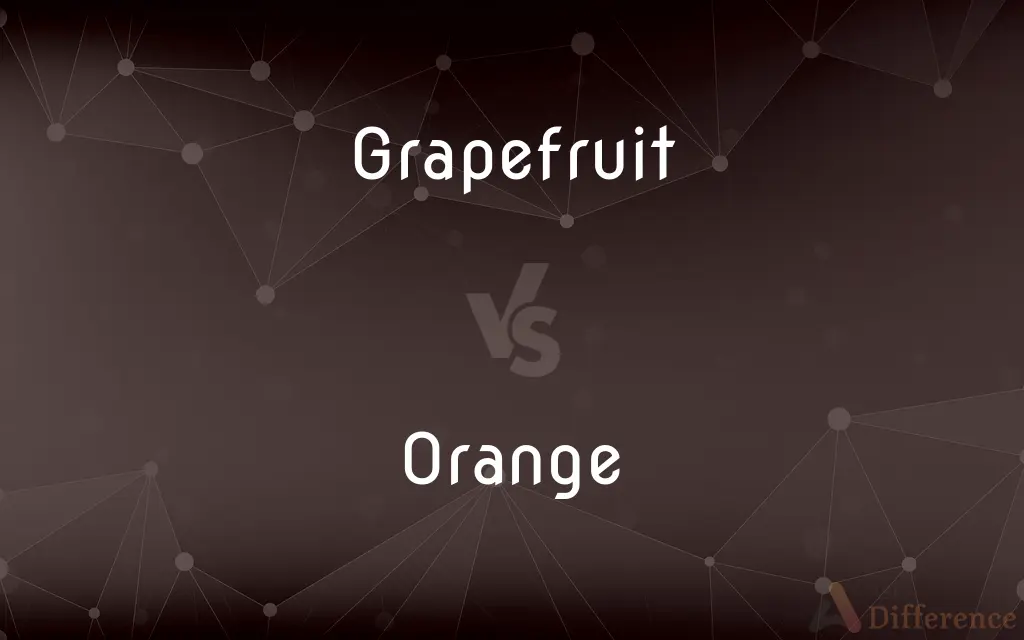Grapefruit vs. Orange — What's the Difference?
By Urooj Arif & Maham Liaqat — Updated on March 11, 2024
Grapefruit offers a tangy, slightly bitter taste and is larger with a thicker skin, while oranges are sweeter, smaller, and have a thinner peel.

Difference Between Grapefruit and Orange
Table of Contents
ADVERTISEMENT
Key Differences
Grapefruit, a citrus fruit known for its tangy and slightly bitter flavor, is typically larger and has a thicker, tougher skin than oranges. Oranges, on the other hand, are celebrated for their sweet taste and are generally smaller with a thinner, smoother peel, making them easier to peel and eat.
The nutritional profiles of grapefruits and oranges differ slightly; grapefruits contain fewer calories and sugars but more vitamin A, while oranges are higher in vitamin C and folate. This makes oranges a better choice for boosting immune function, whereas grapefruits can be more beneficial for skin health and vision due to their vitamin A content.
Grapefruits come in various colors, including white, pink, and red, each with its unique flavor profile and nutritional benefits, particularly in terms of antioxidant content. Oranges, predominantly known for their bright orange color, also vary in types, such as navel, Valencia, and blood oranges, each offering distinct flavors and uses, from juicing to snacking.
The bitterness of grapefruit is attributed to the compound naringin, which can interfere with certain medications, making it important to consult healthcare advice before consuming grapefruit if on medication. Oranges do not have this effect and are generally considered safe to consume with medications.
In culinary uses, grapefruits are often used in salads, beverages, and as a garnish due to their bold flavor, while oranges are versatile in both sweet and savory dishes, juices, and as a popular snack due to their natural sweetness and ease of consumption.
ADVERTISEMENT
Comparison Chart
Taste
Tangy, slightly bitter
Sweet
Size & Peel
Larger, thicker skin
Smaller, thinner peel
Nutritional Content
Lower in calories and sugar, higher in vitamin A
Higher in vitamin C and folate
Varieties
White, pink, red; varying in sweetness and antioxidants
Navel, Valencia, blood; varying in taste and use
Medication Interaction
Can interfere with certain medications
Generally safe with medications
Culinary Uses
Salads, beverages, garnishes
Snacking, juices, sweet and savory dishes
Compare with Definitions
Grapefruit
Grapefruit is a citrus fruit known for its tangy and slightly bitter taste.
Grapefruit adds a refreshing zing to a morning fruit salad.
Orange
Oranges are sweet citrus fruits with a thin, easy-to-peel skin.
Oranges are a popular snack because they're easy to peel and eat on the go.
Grapefruit
Grapefruits can interact with certain medications.
It's advised to avoid grapefruit when taking statins due to potential drug interactions.
Orange
They are a rich source of vitamin C and folate.
Drinking orange juice is a quick way to boost your vitamin C intake.
Grapefruit
They are a good source of vitamins, especially vitamin A.
A serving of red grapefruit provides a significant amount of daily vitamin A.
Orange
Oranges are generally safe to consume with medications.
Oranges don't have the same medication interactions as grapefruit, making them a safer choice.
Grapefruit
It is larger and has a thicker peel than most citrus fruits.
Peeling a grapefruit often requires a knife due to its thick skin.
Orange
There are various types of oranges, including navel and Valencia.
Navel oranges are great for snacking, while Valencia oranges are ideal for juicing.
Grapefruit
Grapefruits vary in color and sweetness, including white, pink, and red varieties.
Pink grapefruit is often sweeter and more flavorful than the white variety.
Orange
Oranges are versatile in culinary uses, from juices to sweet and savory dishes.
Orange zest adds a burst of flavor to both baked goods and savory sauces.
Grapefruit
The grapefruit (Citrus × paradisi) is a subtropical citrus tree known for its relatively large, sour to semisweet, somewhat bitter fruit. The interior flesh is segmented and varies in color from pale yellow to dark pink.
Orange
A town in southern France, on the River Rhône, home of the ancestors of the Dutch royal house.
Grapefruit
A tropical or semitropical evergreen tree (Citrus paradisi) cultivated for its edible fruit.
Orange
Relating to the Orange Order
Orange marches
Grapefruit
The large, round fruit of this tree, having a yellow rind and juicy, somewhat acid pulp.
Orange
Any of several evergreen trees of the genus Citrus of Southeast Asia, widely cultivated in warm regions and having fragrant white flowers and round fruit with a yellowish or reddish rind and a sectioned, pulpy interior, especially the sweet orange and the bitter orange.
Grapefruit
The tree of the species Citrus paradisi, a hybrid of pomelo (Citrus maxima) and sweet orange.
Orange
The fruit of any of these trees, having a sweetish, acidic juice.
Grapefruit
The large spherical tart fruit produced by this tree.
Orange
Any of several similar plants, such as the Osage orange and the mock orange.
Grapefruit
A citrus tree (Citrus paradisi) bearing large round edible fruit having a thick yellow rind and juicy somewhat acid pulp.
Orange
The hue of that portion of the visible spectrum lying between red and yellow, evoked in the human observer by radiant energy with wavelengths of approximately 590 to 630 nanometers; any of a group of colors between red and yellow in hue, of medium lightness and moderate saturation.
Grapefruit
The large yellow fruit of the Citrus paradisi, having somewhat acid juicy pulp. It is a popular breakfast food.
Orange
Of the color orange.
Grapefruit
Citrus tree bearing large round edible fruit having a thick yellow rind and juicy somewhat acid pulp
Orange
Made from oranges.
Grapefruit
Large yellow fruit with somewhat acid juicy pulp; usual serving consists of a half
Orange
Tasting or smelling like oranges.
Orange
(countable) An evergreen tree of the genus Citrus such as Citrus sinensis.
Orange
(countable) The fruit of the orange tree; a citrus fruit with a slightly sour flavour.
Orange
The colour of a ripe fruit of an orange tree, midway between red and yellow.
Orange
Various drinks:
Orange
(uncountable) Orange juice.
Orange
(uncountable) An orange-coloured and orange-flavoured cordial.
Orange
(uncountable) An orange-coloured and orange-flavoured soft drink.
Orange
Having the colour of the fruit of an orange tree; yellowred; reddish-yellow.
Orange
(transitive) To color orange.
Orange
(intransitive) To become orange.
Orange
The fruit of a tree of the genus Citrus (Citrus Aurantium). It is usually round, and consists of pulpy carpels, commonly ten in number, inclosed in a leathery rind, which is easily separable, and is reddish yellow when ripe.
Orange
The tree that bears oranges; the orange tree.
Orange
The color of an orange; reddish yellow.
Orange
Of or pertaining to an orange; of the color of an orange; reddish yellow; as, an orange ribbon.
Orange
Round yellow to orange fruit of any of several citrus trees
Orange
Any of a range of colors between red and yellow
Orange
Any citrus tree bearing oranges
Orange
Any pigment producing the orange color
Orange
A river in South Africa that flows generally westward to the Atlantic Ocean
Orange
Similar to the color of a ripe orange
Common Curiosities
Which is larger, a grapefruit or an orange?
Grapefruits are generally larger and have a thicker skin compared to oranges.
Are oranges higher in vitamin C than grapefruits?
Yes, oranges typically contain more vitamin C per serving than grapefruits.
What is the main taste difference between grapefruit and orange?
Grapefruit has a tangy and slightly bitter taste, whereas oranges are known for their sweetness.
Can I substitute grapefruit for orange in recipes?
While you can substitute them, the taste profile will change due to the bitterness of grapefruit compared to the sweetness of oranges.
What's a popular use for oranges in cooking?
Oranges are popular in juices, salads, and as flavor enhancers in both sweet and savory dishes.
How does the vitamin A content compare in grapefruits and oranges?
Grapefruits generally have more vitamin A, particularly the pink and red varieties, compared to oranges.
What are some health benefits of consuming oranges?
Oranges offer health benefits including high vitamin C for immune support, folate for cell growth, and dietary fiber for digestion.
Can grapefruit affect medication?
Yes, grapefruit can interfere with the effectiveness of certain medications, so it's important to check with a healthcare provider.
Which fruit is better for immune health?
Oranges, with their higher vitamin C content, are excellent for supporting immune health.
What are some common varieties of grapefruit?
Common varieties include white, pink, and red grapefruits, each with different levels of sweetness and antioxidants.
Why are grapefruits bitter?
The bitterness in grapefruits comes from the compound naringin.
Can the peel of these fruits be used?
Yes, the zest of both grapefruit and orange peels can be used to add flavor to dishes and baked goods.
Are pink and red grapefruits sweeter than white ones?
Yes, pink and red grapefruits are often sweeter and less bitter than white grapefruits, making them more palatable to some people.
Are there any oranges that are particularly good for juicing?
Valencia oranges are known for their high juice content and are often preferred for juicing.
Share Your Discovery

Previous Comparison
Ocelot vs. Margay
Next Comparison
Spanish vs. PortugueseAuthor Spotlight
Written by
Urooj ArifUrooj is a skilled content writer at Ask Difference, known for her exceptional ability to simplify complex topics into engaging and informative content. With a passion for research and a flair for clear, concise writing, she consistently delivers articles that resonate with our diverse audience.
Co-written by
Maham Liaqat














































